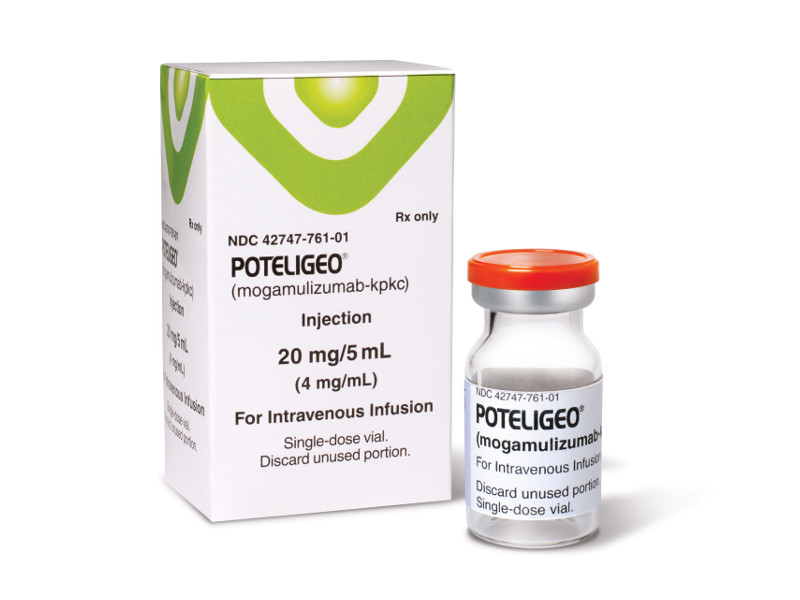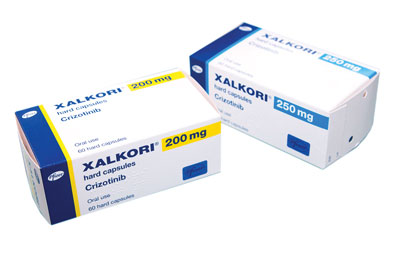Poteligeo (mogamulizumab) vs Xalkori (crizotinib)
Poteligeo (mogamulizumab) vs Xalkori (crizotinib)
Poteligeo (mogamulizumab) is a monoclonal antibody used for the treatment of certain types of cutaneous T-cell lymphoma (CTCL), specifically targeting the C-C chemokine receptor type 4 (CCR4), and is not typically used for other cancers. Xalkori (crizotinib), on the other hand, is a small molecule tyrosine kinase inhibitor that targets ALK and ROS1 receptors and is primarily used in the treatment of non-small cell lung cancer (NSCLC) with specific genetic alterations. When deciding between these medications, it is crucial to consider the type of cancer diagnosed; Poteligeo is appropriate for CTCL, whereas Xalkori is chosen for NSCLC with ALK or ROS1 mutations, and the decision should be guided by a healthcare provider based on the patient's specific condition and molecular profile of the tumor.
Difference between Poteligeo and Xalkori
| Metric | Poteligeo (mogamulizumab) | Xalkori (crizotinib) |
|---|---|---|
| Generic name | mogamulizumab | crizotinib |
| Indications | Adult patients with relapsed or refractory mycosis fungoides or Sézary syndrome after at least one prior systemic therapy | Adults with non-small cell lung cancer (NSCLC) that is anaplastic lymphoma kinase (ALK) or ROS1-positive |
| Mechanism of action | Monoclonal antibody targeting CC chemokine receptor 4 (CCR4) | Tyrosine kinase inhibitor targeting ALK and ROS1 |
| Brand names | Poteligeo | Xalkori |
| Administrative route | Injection (intravenous) | Oral |
| Side effects | Rash, infusion reactions, fatigue, diarrhea, musculoskeletal pain | Visual disturbances, gastrointestinal effects, edema, elevated transaminases, fatigue |
| Contraindications | None known specifically; use caution in patients with severe hepatic impairment or severe renal impairment | Hepatic impairment, concurrent use of strong CYP3A inhibitors or inducers |
| Drug class | Monoclonal antibody | Tyrosine kinase inhibitor |
| Manufacturer | Kyowa Kirin | Pfizer |
Efficacy
Poteligeo (Mogamulizumab) for Lymphoma
Poteligeo (mogamulizumab-kpkc) is an antibody medication specifically designed for the treatment of certain types of lymphoma. It is approved by the Food and Drug Administration (FDA) for the treatment of adult patients with relapsed or refractory mycosis fungoides (MF) or Sézary syndrome (SS), which are types of cutaneous T-cell lymphoma (CTCL). The efficacy of Poteligeo was evaluated in a clinical trial known as the MAVORIC trial, which was a pivotal phase 3 study. In this trial, Poteligeo demonstrated a significant improvement in progression-free survival (PFS) compared to vorinostat in patients with MF and SS who had received at least one prior systemic therapy.
The results from the MAVORIC trial showed that the median PFS for patients treated with Poteligeo was 7.6 months compared to 3.1 months for those treated with vorinostat. This indicates that Poteligeo can effectively delay disease progression in the patient population studied. Additionally, the overall response rate (ORR) for patients treated with Poteligeo was higher than for those who received vorinostat. These findings support the use of Poteligeo as an effective treatment option for patients with relapsed or refractory MF and SS.
Xalkori (Crizotinib) for Lymphoma
Xalkori (crizotinib) is primarily known for its use in non-small cell lung cancer (NSCLC) with specific genetic alterations. However, its efficacy in lymphoma, particularly anaplastic large cell lymphoma (ALCL) that is ALK-positive, has been explored in various studies. ALK-positive ALCL is a rare type of non-Hodgkin lymphoma, and crizotinib targets the anaplastic lymphoma kinase (ALK) that is involved in the growth and development of cancer cells in this disease.
While crizotinib is not FDA-approved for the treatment of lymphoma, some studies have shown that it can have a role in the off-label treatment of ALK-positive ALCL. In these studies, crizotinib demonstrated antitumor activity in patients with ALK-positive ALCL, leading to complete or partial responses in some cases. However, the evidence is less robust than for its approved indications, and further research is needed to fully establish the efficacy and safety of crizotinib in the treatment of lymphoma. Due to the rarity of ALK-positive ALCL, large-scale randomized trials may be challenging, and much of the evidence comes from smaller studies or case reports.
Regulatory Agency Approvals
Poteligeo
-
European Medical Agency (EMA), European Union

-
Food and Drug Administration (FDA), USA

-
Therapeutic Goods Administration (TGA), Australia

Xalkori
-
European Medical Agency (EMA), European Union

-
Food and Drug Administration (FDA), USA

-
Health Canada

-
Pharmaceuticals and Medical Devices Agency (PMDA), Japan

-
Therapeutic Goods Administration (TGA), Australia

Access Poteligeo or Xalkori today
If Poteligeo or Xalkori are not approved or available in your country (e.g. due to supply issues), you can access them via Everyone.org.
How it works

Make an enquiry
Choose the medicine you want to buy, answer a couple of questions, and upload your prescription to speed things up. We’ll get back to you within 24 hours.


Make an enquiry
Choose the medicine you want to buy, answer a couple of questions, and upload your prescription to speed things up. We’ll get back to you within 24 hours.


Breeze through the paperwork
We'll guide you through the required documents for importing unapproved medicine, ensuring you have all the necessary information.


Get a personalized quote
We’ll prepare a quote for you, including medicine costs and any shipping, administrative, or import fees that may apply.


Receive your medicine
Accept the quote and we’ll handle the rest - sourcing and safely delivering your medicine.

Some text on this page has been automatically generated. Speak to your physician before you start a new treatment or medication.
Let's talk
If you have any questions, call us or send us a message through WhatsApp or email:
Contact us




